Hanley Foster, Exchange Student from Australia
Update:Jul. 1,2013
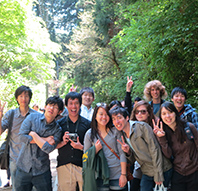
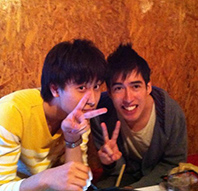
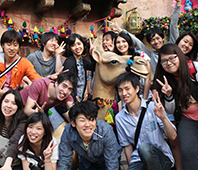
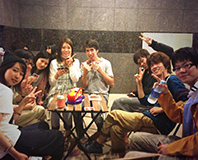
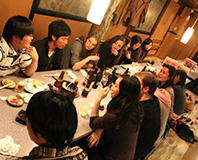
-Which university are you from and what was your major?
I am from the Australian National University (ANU) and I’m currently completing a double degree in Asia-Pacific Studies and Commerce. My majors are Japanese, Asia-Pacific Security and Finance.
-Please tell us the period of your studying abroad.
I began my study abroad in March 2013, and I will be returning to my home institution in February 2014.
-What made you decide to study abroad?
I enjoy travelling a lot and I try to go abroad as much as possible. Many Australian students study abroad in countries all across the world and as this was my final year of study, I decided to take this opportunity to travel overseas and experience studying in another country. The program I am currently enrolled in will also count toward my master’s degree if I choose to continue studying when I return.
-Why did you decide to study in Japan or at Keio?
Since my major is Japanese, I chose Japan so I could improve my language abilities. I have wanted to study at Keio since I was a high school student. I moved to Japan when I was 15 years old because my parents were transferred for work, and lived in an apartment in Mita for 4 years. Tamachi was one of the closest stations to the apartment and I would often walk past the university and think about studying there in the future. I was very pleased to find out that my university had an exchange program with Keio. Keio also has a very good reputation in Australia and is recognized as having a strong language program, which will help me find a job after I finish my studies.
-Please tell us about some of the aspects of your life in Japan or at Keio.
I’m having lots of fun meeting new people all the time. My dormitory (Motosumiyoshi) has a really good community, and all the students there are very friendly and helpful. The first floor has places for people to gather and there are always things happening, so it’s easy to make new friends and have a good time. The Resident Assistants are always organizing fun activities as well; at the start of the year I won two tickets to Tokyo Disney Resort, which I used a couple of weekends ago to visit DisneySea with some friends from my dorm. It was great fun!
-What are differences you have noticed between Keio and your home university?
Classes in Australia are usually 1 or 2 hours long and are taught in lectures and tutorials. Lectures typically have anywhere between 50 and 900 students, and tutorials can have between 10 and 20. Attendance is usually optional, but I try to attend all my classes though I have had friends who have studied the entire semester without attending any classes and getting all the information from the textbook. Other than the differences in classes, most things are very similar, which I found quite surprising. I had heard that the Japanese tertiary education system was very different to Australia’s, but the differences are not as large as most people think.
-Please tell us about what you feel you gained by studying at Keio.
Even though I have only been studying here for 2 months, I feel that my Japanese has improved a lot. This is in part due to the classes, but also because having Japanese friends around all the time means that I can constantly practice my Japanese. My approach to learning Japanese has also changed; some things that I had thought were very different between Japanese and English I found are actually very similar, while other things that I found similar I realize are very different. I’m also grateful for the opportunity to study abroad and make new friends. I think I have gained a unique international perspective that I can take with me when I find a job in the future.
-What is your plan after you finish studying at Keio?
In truth, I haven’t decided yet. I am still considering several different alternatives. I would like to keep studying and get a master’s degree, but I would also like to participate in a graduate work program with a large company or a government department. I am also considering the possibility of travelling abroad for a period of time and working in different countries.
-Do you have any advice for students who are considering studying abroad?
Studying abroad gives you experience and insight that you will find hard to obtain any other way. If you are interested in going abroad, I would recommend that you do everything you can to get to where you want to be because the experience is well worth the effort. Any doubts that you might have about living overseas will be resolved once you get there.
Information of Australian National University (ANU)
Australian National University is located in Canberra, Australia’s capital.
It has nearly 20,000 students including both undergraduates and graduates, and international students make up about one-third of the student body. It is well known for its Asian Studies program, and its College of Asia & the Pacific is the largest of any English-speaking country.
About the writer
Hanley Foster
Japanese Language Program Student
* The facts are those at the time of the interview.
